- Home
- Rudy Rucker
As Above, So Below Page 31
As Above, So Below Read online
Page 31
He depicted early Spring as a Gloomy Day,
late Spring as The Merrymakers,
early Summer as Haymaking,
late Summer as The Harvesters,
Fall as The Return of the Herd, and
Winter as The Hunters in the Snow.
Bruegel had been busy with the pictures for nearly a year now, working at the very limit of his powers, and, as of last night, he was done. He’d painted the wheel of life, the cosmic cycle of Man and Nature. His six panels showed people moving about as part of the landscape, as tightly knit into the world as trees or crows, the human lives a natural part of Earth’s seasonal changes, as above, so below. His great work was finished. For once he felt fully at peace.
Today, he was sitting and resting while Bengt got the pictures boxed up, preparatory to hauling them to Antwerp on a great spring-cushioned wagon that Hans Franckert was going to lend him. The wagon was to arrive tomorrow morning, complete with two strong horses and a teamster.
“Now I know how you felt when you had Little Peter,” said Bruegel to Mayken, admiring the curve of her cheek. “I remember your expression so well. It’s wonderful to give birth, to push your creation out. I’m empty.”
“Not for long,” said Mayken, giving him a loving smile and patting his head. “My horn of plenty.” Despite his year-long immersion in the work, Bruegel and Mayken were on better terms than ever. He’d begun making a point of starting slow in the mornings, always allowing an hour or two for chat with Mayken and for playing with their growing baby boy. It was time well spent, and a relief for his frequently aching stomach. For her part, Mayken seemed more enthralled with the new works than anything Bruegel had ever done. “Aren’t the panels a sight, Prince William?” urged Mayken.
“Indeed,” said William, giving the miraculous paintings a cursory look. Politics meant so much more to him than art; like all the nobles he was eternally self-absorbed. As if their wars and edicts were as important as the truly real. But Jonghelinck would know how to esteem the work, as would the steady stream of cultured people who passed through Jonghelinck’s house. Bruegel felt sure the Seasons would make his reputation once and for all.
“And listen to the part where he reaffirms the Blood Edicts against heresy,” continued William, turning his attention back to his copy of Philip’s letter. “It’s very nearly satanic.” Again he read aloud, his voice trembling with anger. “ ‘Since the men condemned to die advance to execution not in silence but as martyrs dying for a cause, you should consider whether they ought not to be executed in secret in some way or other—though it is true that a public execution also serves to set an example.’ ”
“I went to a public execution last Sunday,” put in Bengt. “A torture jubilee.” Bruegel’s apprentice had matured over the last year. His voice had deepened a bit, his body had fleshed out, and he’d taken to wearing his hair cropped to a short blond stubble that matched the fresh growth on his chin. Bengt had been a tremendous help in finishing the six panels; he was nearly as proud of the work as Bruegel. By now Bruegel and the boy got along as well as uncle and nephew. It hadn’t taken long for Bengt to figure out who “Master Coecke’s ghost” had really been—and it had become a comfortable joke. Even so, Bengt had learned to treat Mayken with caution and respect.
“Their archheretic said very little once they’d ripped his tongue out,” continued Bengt, who’d acquired a discursive, confident manner of speaking. “It was the velvet-maker Le Blas. Did you hear about him? A fanatical Calvinist. On Christmas Day he went to the cathedral, snatched the consecrated wafer of the Host, broke it into bits, threw the fragments on the ground and trampled them, crying out, ‘Do you take this thing to be Jesus Christ?’ ” Bengt shook his head at the thought. “Why would a man to do such a thing?”
“You were at his execution?” said Prince William, eager for fresh news from the streets. “Tell me about it.”
“It took all morning,” said Bengt. “First they burnt three ordinary heretics—two men and a woman who’d done little more than read the Bible together. When called upon for last words, all three avowed their faith in the Church. In return, the priests granted them the mercy of having the executioner strangle them before lighting the faggots around them.”
“And Le Blas?” pressed William.
“No recanting for this fellow,” said Bengt. “He was yelling all manner of things, but, as I said, the executioners tore his tongue out by the roots. They waved it around and threw it into the crowd. It landed near me, in fact, still twitching. Horrible. Waf wanted to eat it, can you imagine? I held him back; another dog made off with it. And then Le Blas’s right hand and foot were burned and twisted off with hot irons—the very hand and foot he’d used against the Host. They threw those into a slow fire they had left over from the three other heretics, a big mound of coals and embers. To finish Le Blas, they fastened his arms and legs behind his back and hung him by a chain over the fire to roast. His clothes charred away and then his skin began to brown and bubble. It was disgusting. Much worse than anything the falcons ever did. I made some drawings.” Bruegel smiled at Bengt. He’d taught the youth always to carry pen and paper. You never knew what you might run across.
“Our Bruegel’s making an artist of you, eh, Bengt?” said William the Sly. “Everything grist for the mill. That’s one way to face these times. The Inquisitors grow more mad and evil all the time.”
“What’s going to happen, Prince William?” asked Mayken. Bruegel glanced over at his wife. She was a bit worried about tomorrow’s trip. She was going to leave little Peter with Old Mayken and accompany Bengt and Bruegel to Jonghelinck’s in Antwerp to see the new paintings installed.
Mayken had matured over the past year too; her face was firmer, a bit more rounded. She was enjoying motherhood and her stewardship of the finances. Bruegel’s relationship with her had grown as sturdy as an oak table. Bruegel felt a rush of affection every time he looked at Mayken, every time he heard the music of her voice. He silently prayed that the storms of war would spare his family.
“The small nobles are banding together into a League,” said William. “They’ve asked me to join, but I’m not ready to set myself so clearly against the Tyrant. There may still be some way to work with him.”
“What will the League of Nobles do?” wondered Mayken’s mother.
“Well, Philip resides in Spain, with no plan of returning here,” said William. “The nobles still hope they can persuade the Regent Margaret here in Brussels to stop enforcing the Blood Edicts. And if she refuses—who knows?” He sighed and got to his feet. “But I did want to warn you not to draw lampoons, Peter. At least not for engravings. And having thus cleared my conscience, I’d also like you to consider privately doing another political painting for me. My friends have enjoyed your Suicide of Saul very much, and they admire how you’ve used a Biblical tale to so aptly present a telling allegory.”
“I’m grateful to hear that, Prince William,” said Bruegel. “I’d be honored to execute more paintings for you. But there’s no current need for concern about lampoons. This year I’ve been taking the broader view. You might say I’ve crawled up to the summit of our angry anthill to have a look at the pastures around. Not that events aren’t conspiring to draw me back inside.”
William looked around, finally seeming to see Bruegel’s new landscapes.
The tree-pruning, waffle-eating peasants of the stormy Gloomy Day.
The circle of dancing maids and youths beside the pond in The Merrymakers.
The three women calmly walking out to rake the field in Haymaking.
The dozy, picnicking peasants of The Harvesters.
The cows and the plain-faced landsmen of The Return of the Herd.
The bedraggled hunters and their pack of dogs in The Hunters in the Snow: the hunters passing an inn and heading down the crest of a hill into a vast snowy landscape filled with the tiny figures of their fellow humans.
“My heart flies right into it,” said W
illiam, standing before the last picture. “It reminds me of—of childhood. When my world was new. God bless you, Bruegel.” William looked around, his expression soft. Now The Return of the Herd caught his eye. “How different these are from your Hell paintings, Peter. Harmony replaces chaos. The birds, the peasants, the cows—all at one with the world.”
“If you look closely at that particular picture, you’ll see a gibbet in the middle distance,” put in Bengt. “It’s the only evil thing in all six pictures. Master Bruegel added it Sunday night after I told him about Le Blas’s execution. If you look very closely you can even see Waf by the gibbet.” Bengt shared Bruegel’s love for fantastic elaboration.
“And perhaps you can find Le Blas’s tongue at Waf’s feet,” said Bruegel with a rueful smile. It had a been a wonderful year, the best year of his life, and who knew now what would come next. “Yes, yes, I’ve a feeling you ants will soon pull me back into your tunnels.”
“And let me be one of the number pulling at you,” said William. “The Prince of Ants. As I say, I’d like you to consider doing something more for me with a political tone. The Princess Anna has been urging me to acquire another Bruegel painting, I might add. One of her counselors told her that your Dulle Griet made quite an impression at the Habsburg court in Vienna, and that now the Archduke Rudolph has carried it off to Prague. Our Bruegel of Brussels begins to acquire the cachet of imperial fashion.” This was sweet music to Bruegel’s ears.
Early the next morning Franckert’s wagon arrived, big and strong with springs, enormous spoked wheels, and a cloth cover to protect the cargo. The teamster driving the wagon was none other than the same Max Wagemaeker who’d been with Franckert that time in the Alps. Fourteen years ago. Incredible how the years were mounting up.
Though thinner and more wrinkled, the leathery Max was as lively and loud as ever. “The famous Peter Bruegel,” he cried when Bruegel opened the door to him. “I tell people I saw you sell your first drawing. I suppose this round-cheeked little vixen is your wife? Lucky man. I’m Max Wagemaeker, Mevrouw Bruegel, much honored to make your acquaintance.”
“Tell me about Peter being famous,” said Mayken with a smile.
“His engravings,” said Max. “Everyone has seen them. I like that matched pair especially, The Fat Kitchen and The Thin Kitchen. Hans Franckert has those up in his dining room. The thin men are trying to drag a fat man inside the Thin Kitchen and the fat men are throwing a thin man out of the Fat Kitchen. He makes a face like this.” Max bent over with an angry, openmouthed grimace and then burst out laughing. “I hope you folks run a Fat Kitchen. The inn didn’t have any porridge ready when I got up. I wouldn’t mind some hot chocolate and scrambled eggs and fried potatoes and plump sausages before I start helping you move your pictures. What floor is your studio on?”
“I’ll tell you after you’ve eaten,” said Bruegel. “Come on inside.”
Later they got the crated panels loaded onto the wagon, and then Bruegel, Mayken, Bengt, Waf, and Max set off on the road to Antwerp, the two powerful draft-horses picking their way across the ice and snow. They moved along at a rapid clip, with Mayken and Wagemaeker sitting on a bench at the front of the wagon, and Bengt and Bruegel sitting on the wagon’s back, where they could keep an eye on the crated pictures. Waf alternated between running alongside them and jumping aboard.
The road led through the open countryside towards Mechelen, accompanied for a bit by the newly dug Willebroek Canal, which eventually veered off to the west, taking a shortcut to the Scheldt. The bright, overcast sky was colored a shade of whitish green that bespoke more snow today. They rattled through little villages and past frozen marshes with skaters upon them.
“Have you thought what you’ll paint next, Master Bruegel?” asked Bengt.
“Something for Prince William, I suppose,” said Bruegel. “If not another piece for Jonghelinck. Right now, for once, I’m empty. Just a pair of eyes. It’s a fine day, eh? Look how many birds are out and about.” A flock of starlings fluttered up from some hawthorn thickets; three black-billed crows cawed from a pine tree; and now Waf flushed a whirring covey of quail. The damp black branches and twigs stood out against the snow like fresh-painted ivory black lines. But no man had labored over this exquisite tracery, God had put it here for free. Up ahead was a cluster of farmhouses beside a pond. The snow-covered roofs were yellow-tinted white lozenges; the pond ice mirrored the sky’s pale green. Craning towards the front of the wagon, he could see Mayken happily chatting with Max. How wonderful it was to be alive.
“I used to dream I was a falcon,” said Bengt. “In the most beautiful dream of all, I was flying through the snow, the big flakes coming at me.”
“You’re a born artist,” said Bruegel, savoring the image. “Is your father still angry with you?”
“No,” said Bengt. “We’ve made up. It helps that he’s found a new assistant. One of my cousins from Valkenswaard. Do you think Little Peter will be a painter?”
“I hope so,” said Bruegel. “He’s my son.” He emphasized the remark with an elbow to Bengt’s ribs.
“No squawks from me,” said Bengt with a smile. “I’d hate to face Master Coecke’s scimitar again.”
“Do you know anything about your own father?” asked Bengt after a bit.
“Most likely it was Filips de Hoorne’s tutor,” said Bruegel. “Though it could also have been Filips’s father. The old Graaf was always so kind to me when I was young. And you saw how Filips embraced me at Young Peter’s christening.”
“Why don’t you ask him straight out?”
“It could put him in an awkward spot,” said Bruegel. “If he were to say that I’m his brother, then he’d have the worry that I might try to claim an inheritance.”
“Every bastard thinks he’s nobility,” shouted Max, who’d overheard them. “Forget your dreams of glory and be glad you don’t know your parents. Mine were drunken animals with seven children. I ran away when I was ten years old, and they didn’t even notice. I grew up sleeping in the stables at the inn. Given the choice, I prefer living with horses.”
It seemed that every village they passed had a gallows and some wheels on poles. The most recently hanged heretic was always left to dangle from the gibbet until a new one arrived, and then the old body would be placed atop a wagon wheel on a pole for the crows. Some villages had several wheels, and many of the wheels were laden with more than one body. This year had brought more executions than ever, and the coming year seemed likely to bring many more. Under Philip’s edicts it took almost nothing to be executed for heresy. Not only was it proof of heresy for a solitary person to sing a psalm or to read the Bible or to pray, it was equally a capital offense to fail to report any friend or family member who indulged in such anathematized acts of piety. There was hardly a man or a woman in the Low Lands who wasn’t technically subject to execution, and where facts were lacking, they could easily be made up. The Spanish rulers and their clergy were free to kill whomsoever they chose. Not only did they seek out the rebellious, the wealthy people and landowners were also being executed so that Spain could claim their goods.
When they approached Antwerp it was near dusk. Liberal, worldly Antwerp was the one place in the Low Lands were the Inquisition was still mild. For the benefit of trade, the Regent and her minions tolerated some freedom of thought in this rich port. The single gallows outside the city held a body that had hung so long in the sun and rain that it resembled a homely bundle of faded rags, the bones like clean, weathered wood.
The taxman at the gate knew of Bruegel, and, upon seeing the six crated pictures, demanded some pieces of silver. Bruegel paid him, and then they were rolling down the familiar streets. It was comfortable to see the spire of the Our Lady Cathedral once again. Fresh snow began to fall.
Nicolas Jonghelinck’s house was on a fine big lot at the eastern edge of the city. Lights in the windows brightened the falling snow, and as they approached they could hear voices. In the front hall, Jonghelinck ha
d gathered some guests to greet them: Jonghelinck’s sculptor brother Jacob, Christopher Plantin and wife recently returned from their exile, the printer Jerome Cock, the painters Frans Floris and Martin de Vos, big Hans Franckert and his wife Hennie van Mander, good old Abraham Ortelius and—Williblad Cheroo. Bruegel hadn’t seen Cheroo since his studio back in Hoogstraat. Cheroo’s nose was flat and crooked—Grauer and his men had indeed broken it, most thoroughly.
When they were planning the trip, Mayken had wondered out loud if it would be too awkward for her to face Williblad. But Bruegel had urged her to come. It was Mayken who’d planted the germ of the Seasons panels in his mind, she who’d negotiated a proper fee with Jonghelinck, she who’d stood by him during this long year of creation, she who was his beloved, and Bruegel wanted her to share the glory of the final installation. And, despite any doubts, Mayken too wanted to be here for the great event.
“Hello, Peter,” said Williblad, walking right up to Bruegel. “You’re looking well. I can see that marriage agrees with you. You’re a lucky man.” Williblad himself looked not quite so finely turned out as in the old days. Though he was dressed in maroon velvet, the material showed some signs of wear. And, for the first time, there were silver strands in his smooth black head of hair. Bruegel went ahead and shook his hand. In the end, after all, it had been Bruegel who’d won Mayken. And today, of all days, he could afford to be big-hearted.
“And I’m pleased to see you as well, Mevrouw Bruegel,” said Williblad, kissing Mayken’s hand and executing a bow.
“You keep away from me,” said Mayken with a disarming laugh. Williblad smiled rakishly, then drifted off across the hall to drink and talk with Frans Floris. Bruegel felt proud of how easily she’d handled him. He and Mayken looked at each other, feeling they’d weathered the initial encounter in good form. It seemed that all would be well.

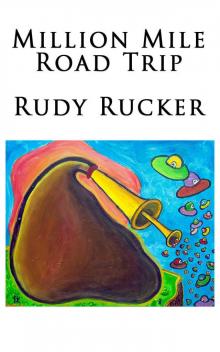 Million Mile Road Trip
Million Mile Road Trip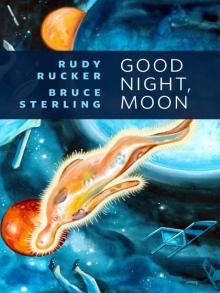 Good Night, Moon
Good Night, Moon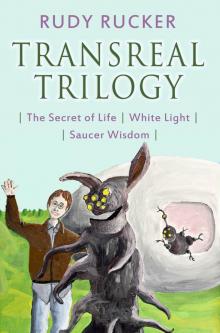 Transreal Trilogy: Secret of Life, White Light, Saucer Wisdom
Transreal Trilogy: Secret of Life, White Light, Saucer Wisdom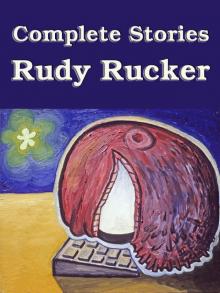 Complete Stories
Complete Stories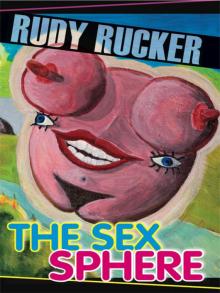 The Sex Sphere
The Sex Sphere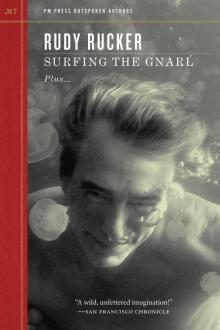 Surfing the Gnarl
Surfing the Gnarl Software
Software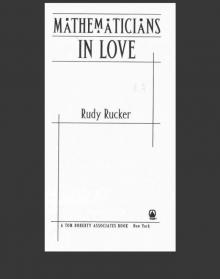 Mathematicians in Love
Mathematicians in Love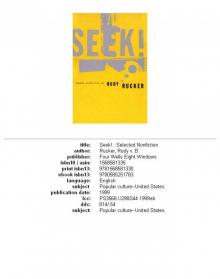 Seek!: Selected Nonfiction
Seek!: Selected Nonfiction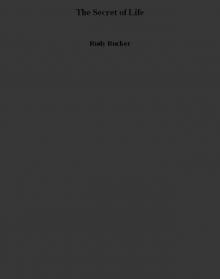 The Secret of Life
The Secret of Life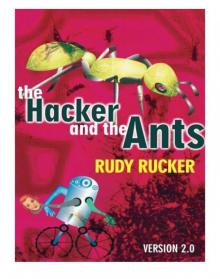 The Hacker and the Ants
The Hacker and the Ants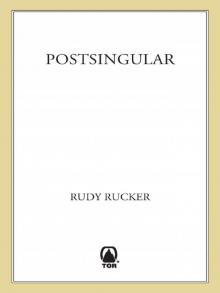 Postsingular
Postsingular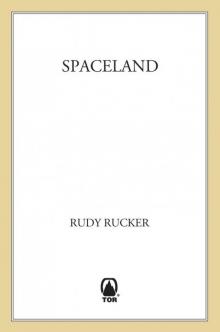 Spaceland
Spaceland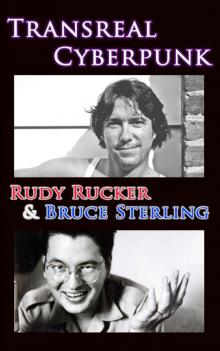 Transreal Cyberpunk
Transreal Cyberpunk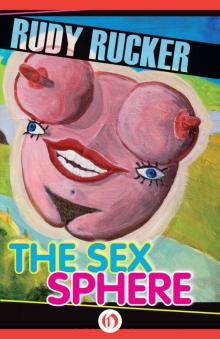 Sex Sphere
Sex Sphere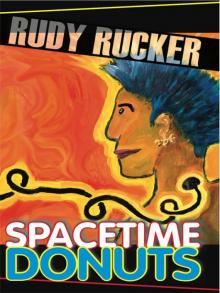 Spacetime Donuts
Spacetime Donuts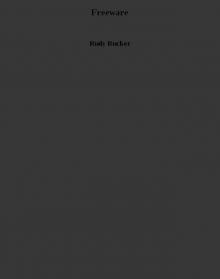 Freeware
Freeware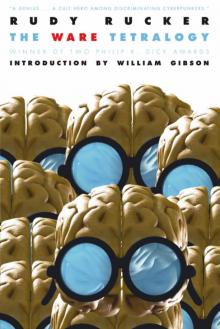 The Ware Tetralogy
The Ware Tetralogy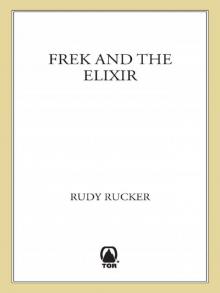 Frek and the Elixir
Frek and the Elixir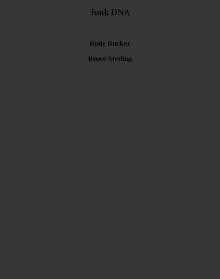 Junk DNA
Junk DNA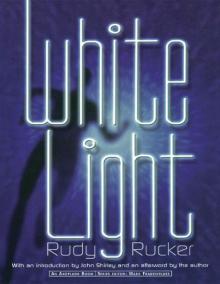 White Light (Axoplasm Books)
White Light (Axoplasm Books)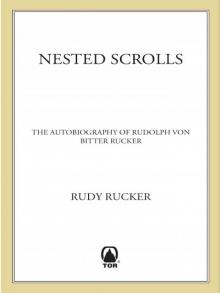 Nested Scrolls
Nested Scrolls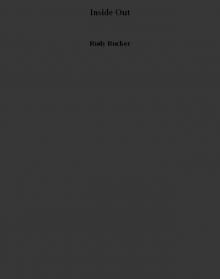 Inside Out
Inside Out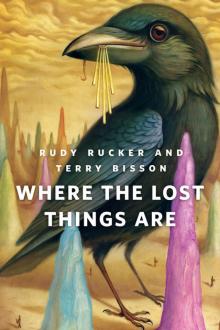 Where the Lost Things Are
Where the Lost Things Are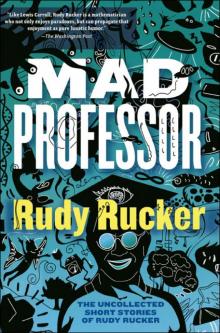 Mad Professor
Mad Professor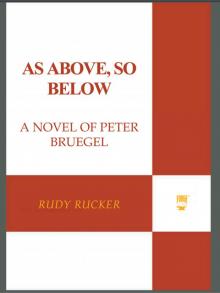 As Above, So Below
As Above, So Below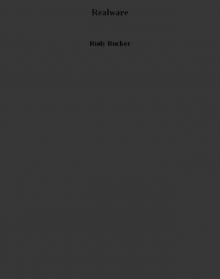 Realware
Realware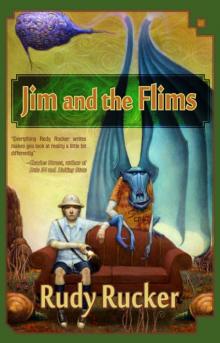 Jim and the Flims
Jim and the Flims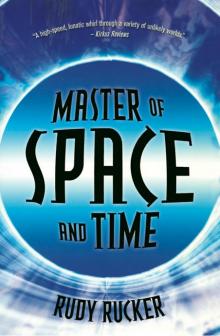 Master of Space and Time
Master of Space and Time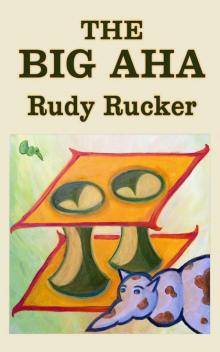 The Big Aha
The Big Aha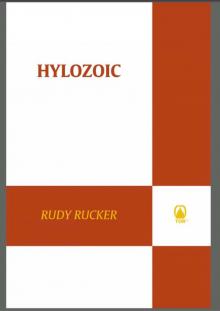 Hylozoic
Hylozoic